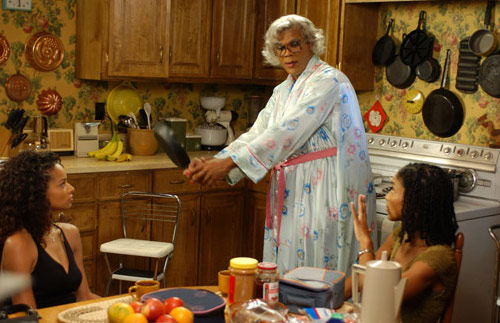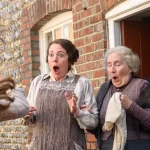Farce for the Whole Family, by Jack Fleischer
The plot here is nearly irrelevant. A family matriarch tries to gather her entire family together to tell them a secret and it proves problematic. Her friend Madea (actually a side character) then offers to help gather the brood. This might even be giving away too much, as the ad campaign for the movie ignores the plot with posters that parody movies like Black Swan and The Godfather.
At the heart of Happy Family are three educational keywords: didactic, satiric, farce. Some of these have negative connotations, but I think fans and haters alike would use them.
This movie is not about plot or character depth. After talking with die hard fans of the series, I understand that the key motive of the Perry oeuvre is, “Family is important.” This film is no different. If you disagree with this idea, or don’t want to be reminded of it, avoid this film. This movie is driven by its moral, and uses well-established and overdrawn personality types to demonstrate its points. Perry standards, The Browns (TBS’s “Meet The Browns”), even show up here in an oddly placed sitcom-esque B story arc. One complaint I had, being new to the series, is that sometimes it was difficult to follow all the character’s relations to each other.
The primary argument against Perry is abuse of stereotypes, and his characters are indeed broad. But, to quote Wikipedia, “in satire, vices, follies, abuses, and shortcomings are held up to ridicule, ideally with the intent of shaming individuals, and society itself, into improvement.” I’d say that these characters are designed to ridicule the stereotypes. Just to be safe: White people, while many characters here are broadly drawn, they don’t represent all people of color. In the sprit of equality, folks of color, know that I work every day to be less and less like Gallagher and I have almost nothing in common with Robert Blake.
Lit majors, how many of you dig on Chaucer? Molière? This movie is a farce just like “The Canterbury Tales” or “Tartuffe.” If those titles mean nothing to you, take it from Wikipedia (again), “a farce is a comedy which aims to entertain the audience by means of unlikely, extravagant, and improbable situations, disguise and mistaken identity, verbal [humor] of varying degrees of sophistication.” This movie teams with unsophisticated humor. Men in drag, fart jokes, and at least one joke directly lifted from Rush Hour. But I’ve laughed at it all before, and I’ll probably laugh at them again.
There is funny stuff here, including one joke in particular from Joe, Perry’s other costumed character, that killed me. Then, when it comes to “improbable situations,” there’s the movie’s climactic twist – which really isn’t so improbable, and happened to at least two celebrities (kudos if you can you name them below).
In Happy Family, the acting, like the humor, is over-the-top. But in particular, it was hard not to enjoy watching Teyana Taylor’s Sabrina. I also love character actress Loretta Devine (“A Different World,” “Boston Public”); more work for her is a good thing.
The broad acting style drives home one last important point; this movie is essentially a filmed play. The camera work is almost entirely static talking head shots and there’s no orchestral soundtrack. One song backs up an unnecessary montage, and then there’s a scene with a live gospel choir, but that’s really it for tunes.
Just like a play, I’d also recommend watching it with a live audience. It really is an odd x factor that can add to a movie, and here it just feels right.
If you’ve never done Madea before, give it a shot before you hate. You can start with this one. While not for all, given the right frame of mind and a live audience, I might watch it again.
It’s better than Carrot Top.






























I agree, watching Tyler Perry movies with a live audience is much better than seeing them on your own since you’re more likely to laugh at things you wouldn’t necessarily laugh at. Like you said, the acting wasn’t bad either.